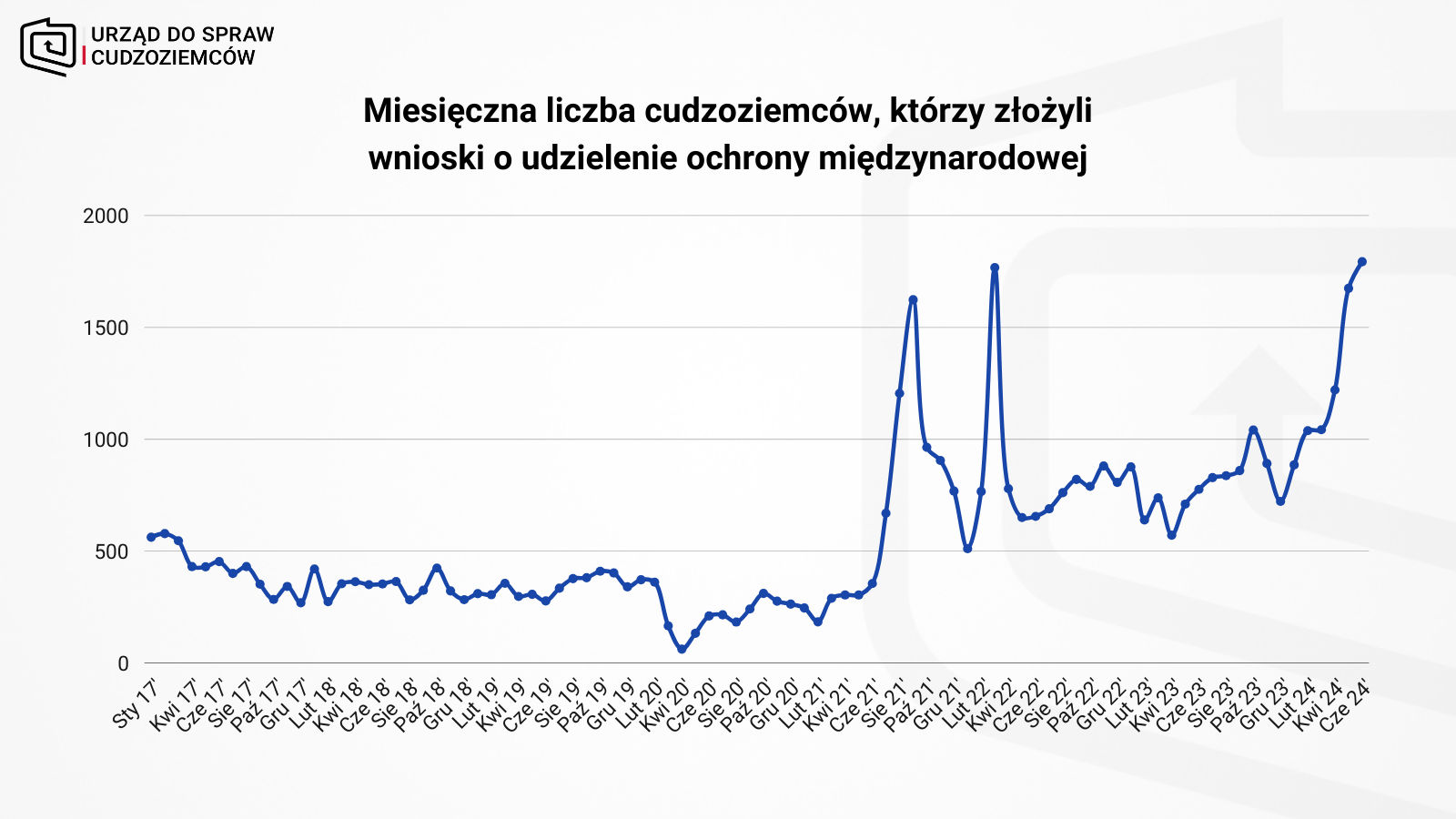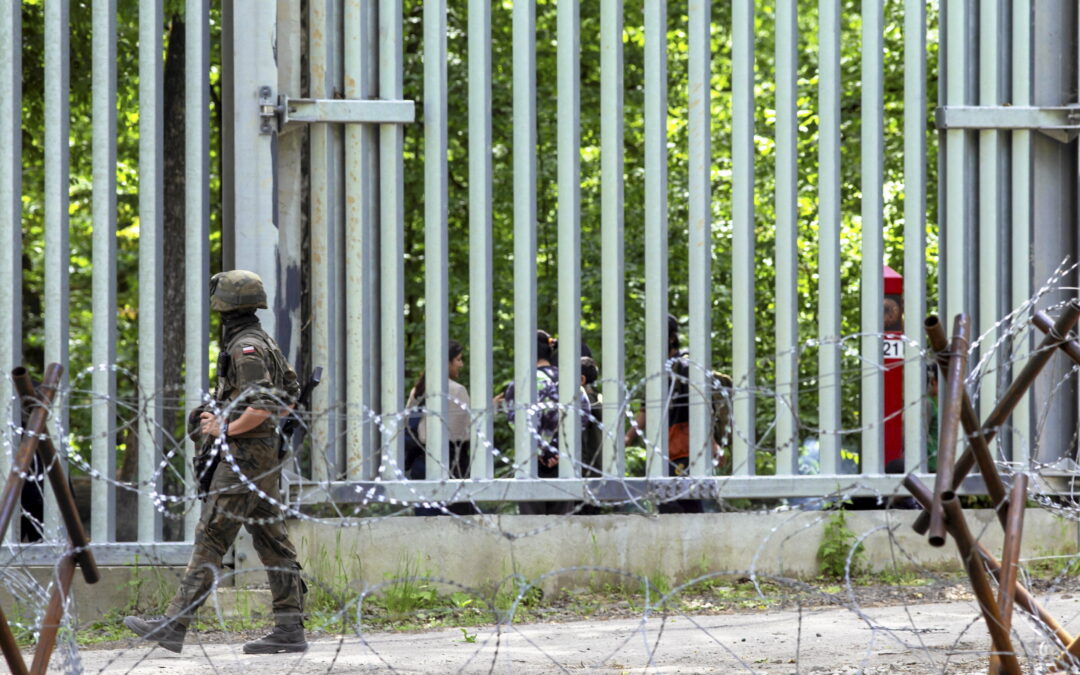In the first half of this year, 7,716 foreigners applied for international protection in Poland, 79% more than in the same period a year earlier, official data show. In June alone, 1,766 foreigners applied for asylum, the highest monthly total in at least seven years.
Most applications (almost 60%) came from citizens of Ukraine and Belarus. But the biggest relative increase in applications was recorded among people from African countries, including Somalia (with an 11-fold rise) and from the Middle East, including Syria (a four-fold rise).
The figure came amid a renewed crisis on Poland’s border with Belarus, where large numbers of migrants and asylum seekers – mainly from the Middle East, Asia and Africa – have been seeking to cross with the encouragement and help of the Belarusian authorities.

Monthly number of foreigners who have applied for international protection in Poland.
In the first six months of 2024, some 2,655 Ukrainians, 1,952 Belarusians, 547 Russians, 347 Somalis and 328 Syrians, among others, applied for asylum in Poland, show figures from the Office for Foreigners (UdSC), a state body.
The majority of applications were made by men – about 5,100, compared to 2,600 women. In the case of both sexes, the most applications came from people aged 18-34. Children up to 13 years of age accounted for 17% of applications. Teenagers aged 14-17 accounted for just under 4%.
During the period in question, Poland also issued 4,686 decisions on asylum applications. Requirements for receiving international protection were met in around 3,000 cases, including about 1,400 Belarusians, 1,300 Ukrainians and 100 Russians.
Sorry to interrupt your reading. The article continues below.

Notes from Poland is run by a small editorial team and published by an independent, non-profit foundation that is funded through donations from our readers. We cannot do what we do without your support.
“In the case of Russian nationals who were eligible for international protection, these were mainly persons at risk of persecution or serious harm in Russia for, inter alia, carrying out opposition activities, opposing the war or belonging to certain social or religious groups,” UdSC spokesman Jakub Dudziak told Dziennik Gazeta Prawna.
In the case of Ukrainian and Belarusian nationals, the most common reasons for seeking protection in Poland are security concerns related to the war in Ukraine and repression by the Belarusian authorities, reported the newspaper.
However, most Ukrainian refugees in Poland have a different legal status introduced after they began to arrive en masse after Russia’s full-scale invasion in 2022. According to Eurostat data, at the end of June, 965,775 people, including 961,180 Ukrainians, were covered by such temporary protection in Poland.
Poland says it could face a new wave of Ukrainian refugees as cold weather sets in later this year and Ukraine struggles with growing damage to its energy infrastructure caused by Russian attacks https://t.co/GcTYjl575F
— Notes from Poland 🇵🇱 (@notesfrompoland) July 26, 2024
In the first half of this year, about 760 foreigners were denied asylum in Poland, including 320 from Russia, 50 from Belarus and 45 from India.
Proceedings concerning almost 1,000 individuals ended in discontinuation, which usually happens when a foreigner who applied for protection has left the country before a decision was issued. This concerned mainly citizens of Russia (roughly 200 cases), Syria (100) and Afghanistan (80).
“Consistently, a frequent reason for submitting refugee applications is the desire to cross the external border of the European Union and travel further to western European countries,” said Dudziak.
While applying for protection, foreigners may benefit from social assistance such as accommodation, food, medical care, and educational activities, including learning the Polish language. As of 30 June 2024, 5,900 foreigners were receiving such social assistance, of which 940 were living in special centres for foreigners.
Poland has launched a special app, called Refugeebook, to help those who have applied for asylum.
Available in Polish, English, Russian and Ukrainian, it provides information on their rights and obligations as well as support available to them https://t.co/ZNthLn1YB6
— Notes from Poland 🇵🇱 (@notesfrompoland) April 26, 2024
In the first half of this year, Poland saw renewed migratory pressure on its border with Belarus, which is often used by people from the Middle East and Africa as a way to get into the EU. There has also been a surge in aggression from some migrants which, in one case, led to the death of a Polish soldier.
The government responded by introducing an exclusion zone on part of the border and seeking to update the law on the use of firearms by officers working at the border.
Acording to data from the Polish border guard the number of illlegal crossing attempts halved in the three weeks after the introduction of the exclusion zone.
However, Poland has also faced criticism from human rights groups for its practice of “pushing back” migrants to Belarus after they have crossed, including allegedly in some cases people who have declared a desire to claim asylum in Poland.
The Council of Europe’s human rights commissioner has voiced concern at Poland’s response to the migration crisis on its border with Belarus.
Poland has written back to him saying that the situation is one "that international law could not have predicted" https://t.co/q2WDXddXSo
— Notes from Poland 🇵🇱 (@notesfrompoland) July 24, 2024
Main image credit: Agnieszka Sadowska / Agencja Wyborcza.pl

Alicja Ptak is deputy editor-in-chief of Notes from Poland and a multimedia journalist. She has written for Clean Energy Wire and The Times, and she hosts her own podcast, The Warsaw Wire, on Poland’s economy and energy sector. She previously worked for Reuters.



















